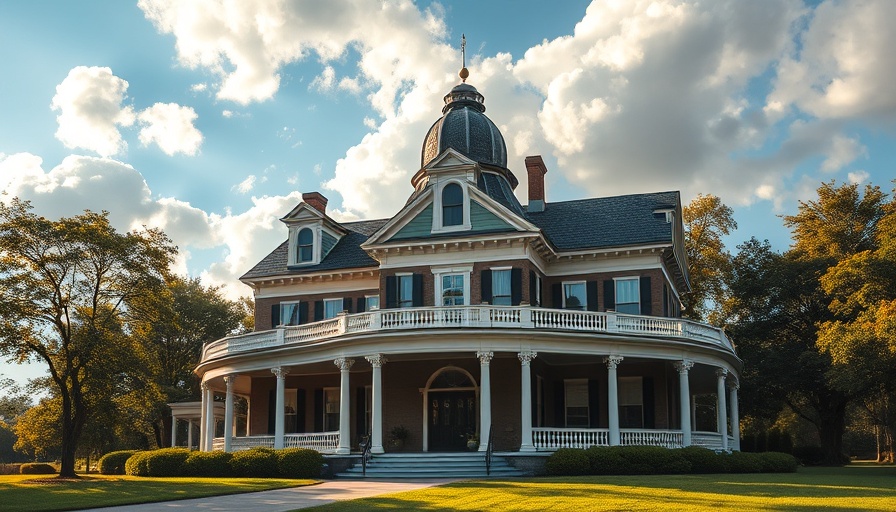
Embracing the Value of Spacious Living
In recent years, the trend of minimalism has taken the world by storm, often leading many to value smaller homes over spacious ones. However, for families considering their long-term comfort and well-being, the benefits of owning a larger home should not be overlooked. After experiencing the cramped quarters of temporary housing during a recent family trip, it's clear that larger homes provide unparalleled advantages.
A Historical Perspective on Home Sizes
Since the 1980s, the average size of new homes has steadily increased. In 1981, the median size of a new home was about 1,700 square feet, gradually rising to an impressive 2,233 square feet by 2023 according to the U.S. Census Bureau. This growth reflects a societal shift towards valuing space and modern amenities that cater to family needs. In essence, homes are not just dwellings; they have transformed into comfort zones that accommodate our evolving lifestyles.
The Ideal Big Home: What Does It Mean?
Defining a 'big home' is crucial when comparing living spaces. According to my assessment, a big home should be at least 50% larger than the national median size—approximately 3,100 square feet or more. This space allows for not just additional bedrooms, but also the luxury of personal space, an essential factor for families with children.
Why Large Homes Are Essential for Families
For families with children, a spacious home can mean the difference between chaos and calm. Having ample bedrooms ensures that everyone has personal space, reducing nighttime disturbances and contributing to healthier sleep patterns. A larger living area means children can play freely without the constant worry of disturbing others, and parents can enjoy the sanctuary of a quiet room when needed.
Personal Experiences: A Case for Bigger Homes
During a recent 35-night vacation spent in cramped accommodations, I became acutely aware of how valuable my big home truly is. My family found ourselves sharing tight spaces, which led to sleep disturbances and a lack of privacy. One restless night concluded with my daughter awakening us repeatedly, showing the pitfalls of poor space management. A larger home would have provided capable sleeping arrangements and improved everyone’s mood.
Financial Considerations: Weighing Costs Versus Benefits
While larger homes typically come with higher price tags, it's essential to consider the long-term financial implications. Owning a big home isn't just about the current expense; it often increases in value in line with family needs and market trends. Larger properties usually appreciate more than smaller homes, making them a solid long-term investment. Moreover, with the rising costs of vacation rentals that often don't match the comfort of home, owning a spacious residence can save families money over time by eliminating the need for costly getaways.
Future Trends: Shifting Towards Bigger Spaces?
With more families prioritizing space as remote work continues to gain traction, we could see a resurgence in the demand for larger homes. This shift may lead to changes in housing development trends, prompting builders to create more expansive family-oriented designs in suburban areas. As work-life balance transitions to include home office spaces, the value of larger homes could become even more pronounced in the coming years.
Emotional and Human Aspects of Home Ownership
Owning a big, beautiful home is not solely a matter of financial investment; it’s also about emotional well-being. Spacious family homes often create an atmosphere conducive to bonding and relaxation. They offer environments where families can celebrate milestones, find quiet moments together, and create lasting memories. Living comfortably allows families to focus on building relationships rather than stressing over space constraints.
In Conclusion: The Case for Spacious Living
Ultimately, while the minimalist trend has its benefits, the comfort and functionality provided by larger homes cannot be dismissed. Families like mine face the reality of growing kids and the resultant need for space. As we move towards a future that values remote working and home-centered lifestyles, the appreciation for owning larger homes may just grow exponentially. If you’re contemplating your family’s space needs, consider the long-term benefits of investing in a beautiful big home.
If these insights resonate with your personal situation, take action by evaluating your living space and considering how a larger home could enhance your family's comfort and lifestyle. As they say, home is where the heart is—so why not make it a spacious one?
 Add Row
Add Row  Add
Add 




 Add Row
Add Row  Add
Add 

Write A Comment